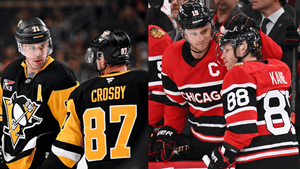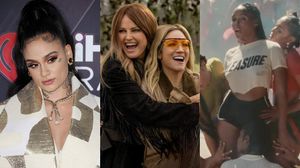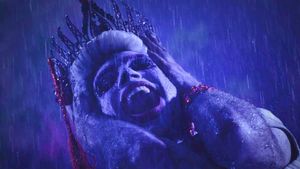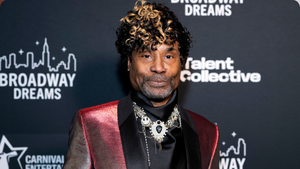Some high-profile
gay actors have exited the closet recently, and the fan
reaction has been...almost nonexistent.
A gay man playing
a randy heterosexual on TV? The industry still has its
problems, but viewers are just shrugging.
On the most
recent episode of ABC's Grey's Anatomy, T.R.
Knight's character eloped to Las Vegas with his
gorgeous girlfriend. One week earlier, after repeated rounds
of vigorous sex, he proposed to her in a scene that
was romantic, believable--and groundbreaking.
Knight is an
openly gay actor--now. He outed himself to
People magazine after costar Isaiah Washington
uttered an antigay slur on the set of the series last
October. Yet nearly all the attention to the
controversy has focused on Washington's transgression.
There's been nary
a comment about Knight's own love life. Instead, fans
are reveling in the sparks flying between his character and
Dr. Torres (Sara Ramirez): ''I hope she says yes. I
really think he loves her!'' said a recent posting
about the characters' engagement on the show's chat
room. ''They're such a nice couple!'' raved another.
Clearly, these
are no longer the days when Rock Hudson needed to
feign interest in starlets to protect his career.
''Things have
changed,'' said Ellen DeGeneres to Knight last month on her
talk show; DeGeneres's coming-out a decade ago was a major
cultural moment.
Knight isn't
alone in having his sexuality greeted with a public yawn.
Last November actor Neil Patrick Harris described himself in
a brief statement to People magazine as a
''contented gay man.'' Past American Idol
finalist R.J. Helton made a similar announcement weeks
earlier, and former 'N Sync star Lance Bass did the
same last August.
Each became
barely a blip on the pop-culture radar.
The mellow
response to these celebrity self-outings is a far cry from
what happened after DeGeneres's ''Yep, I'm Gay''
announcement on the cover of Time magazine.
Back then, some predicted the end of DeGeneres's
career. Ten years later she's anything but unemployed:
She's hosting this month's Oscars, currently helming her
own Emmy-winning talk show, and serving as one of the celeb
faces of American Express.
Strangely enough,
some gay actors say that while America's comfort level
has improved considerably, the entertainment industry hasn't
caught up. It may be 2007, they say, but the vibe
inside studio casting offices can feel surprisingly
like 1957.
These actors say
being outed remains a huge threat to a performer's
career, particularly for men. An announcement, even a rumor,
can eliminate them from the running for straight
roles--the roles that make up the vast majority
of available work.
''I have friends
in the industry--casting directors, for an
example--who are gay, who will not cast another
person and the reason given is, 'Oh, he's too gay,' ''
says veteran performer Andre de Shields, an openly gay
actor who's earned two Tony award nominations. ''A lot of
this has to do with self-loathing.''
Despite its
reputation for leading the world down a hedonistic path,
''Hollywood is one of the most homophobic places on the
planet,'' de Shields says. ''And these are the folks
who could make the biggest difference in artists'
lives.''
Established gay
male stars like Rupert Everett face this kind of bias (as
Everett laments in his recent autobiography), and so do
those still making their mark.
''I was told I
was 'too light' for Judging Amy,'' says Kevin
Fabian, an openly gay actor who has appeared on
episodes of The West Wing, Will & Grace,
and other prime-time shows. ''I looked at the casting
director and said, 'Have you watched your show?' ''
That sort of
experience leaves gay actors questioning how much progress
has really been made.
''From an actor's
point of view, I understand why they are scared to
death of saying anything for fear of being pigeonholed,''
says casting director Matt Messinger. ''Gay people are
cast as straight all the time. But if you're asking if
things have improved for openly gay actors, I can't
say it's any easier now.''
When Knight
revealed his sexual orientation last fall, he offered a
brief but pointed statement: ''I hope the fact that
I'm gay isn't the most interesting part of me.''
For actor and
singer Kye Brackett, the decision to mention his
bisexuality to casting directors comes down to exactly
Knight's point: Will industry people be so distracted
by the fact that he dates men that they won't see him
as a performer?
Brackett
remembers seeing a billboard for the Tom Cruise film Born
on the Fourth of July in 1989.
''There was a
whole rumor that had begun about Tom Cruise being gay. And
I remember driving up the street and seeing his picture and
my first thought was, 'There's Tom Cruise. He's gay,'
'' says Brackett. ''All these things he actually
worked for got immediately overshadowed by a rumor....
Who would want to deal with that as an actor?''
Because of that
bias, Brackett says, agents are unlikely to recommend
openly gay clients for straight roles. ''They don't want to
be the one who says, 'This person is gay, and that's
fine.' ''
Despite the risk,
some actors feel there's little choice but to deal
directly with their sexuality. Fabian says he temporarily
hid his sexual preference during acting school. The
result, he says? ''My acting was terrible. You're
constantly putting layer on top of layer.''
The current crop
of tabloid magazines and nightly entertainment-news
shows have brought the decades-old fascination with
performers' personal lives to a new level. They love
focusing on the subject of who's gay and who isn't,
though there appears to be a double standard in their
approach.
Actresses may
acquire a bit of positive buzz and be ''seen as sexy''
after rumors of gay romance, says Lillian Faderman, coauthor
of the book Gay L.A. But men in the same
situation are perceived differently.
''Things have
certainly improved for women in Hollywood, but far less so
for men,'' says Faderman. ''But it's interesting that the
most prominent examples I can give--Ellen
DeGeneres, Melissa Etheridge, Lily Tomlin--they
don't play romantic leads.''
A National
Enquirer cover last August trumpeted ''Hollywood's
Secret 'Gay List' '' in bold black letters above
photos of various leading men. Inside, they reported the
estimated odds of these celebrities coming out.
Network
executives, Fabian says, fear negative coverage in the
tabloids. And they prefer not to cast openly gay
actors in straight roles because they want those
tabloids to publicize their stars' social lives
positively.
''You go in for a
pilot, and you're told the casting director loves you,
the producer loves you,'' says Fabian. ''Then you go to
network, and you have to sign your five-year deal
first. I think that's where the real discussion is
going on: 'We really liked him, but.... He's really funny,
but.... How can we get him out there with the girls when
he's sitting home with his boyfriend every day?''
Knight's case
will be an interesting litmus test of whether recent
celebrity outings will encourage the industry to change its
approach.
Before his
announcement, Knight had already developed a fan base. TV
viewers have also warmed to Harris's performance as a
straight, womanizing character on the CBS sitcom
How I Met Your Mother, now in its second
season. Comments posted on imdb.com describe Harris as
the best thing about the show.
Should these
shows run for several more years and audience support remain
strong, Hollywood may have no choice but to continue
offering both men the straight romantic roles they
play so well.
That could open a
door to broader casting options for all actors,
something Fabian would welcome. ''In the end, I want to
work. I want to be successful as an actor,'' he says.
''I want to have vacations and not worry about the
credit cards not working.'' (Melissa Rayworth, AP)




































































Charlie Kirk DID say stoning gay people was the 'perfect law' — and these other heinous quotes